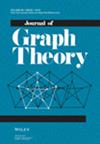求助PDF
{"title":"弗兰克尔-库帕夫斯基关于边缘联合条件猜想的证明","authors":"Hongliang Lu, Xuechun Zhang","doi":"10.1002/jgt.23073","DOIUrl":null,"url":null,"abstract":"<p>A 3-graph <math>\n <semantics>\n <mrow>\n \n <mrow>\n <mi>F</mi>\n </mrow>\n </mrow>\n <annotation> ${\\rm{ {\\mathcal F} }}$</annotation>\n </semantics></math> is <math>\n <semantics>\n <mrow>\n \n <mrow>\n <mi>U</mi>\n \n <mrow>\n <mo>(</mo>\n \n <mrow>\n <mi>s</mi>\n \n <mo>,</mo>\n \n <mn>2</mn>\n \n <mi>s</mi>\n \n <mo>+</mo>\n \n <mn>1</mn>\n </mrow>\n \n <mo>)</mo>\n </mrow>\n </mrow>\n </mrow>\n <annotation> $U(s,2s+1)$</annotation>\n </semantics></math> if for any <math>\n <semantics>\n <mrow>\n \n <mrow>\n <mi>s</mi>\n </mrow>\n </mrow>\n <annotation> $s$</annotation>\n </semantics></math> edges <math>\n <semantics>\n <mrow>\n \n <mrow>\n <msub>\n <mi>e</mi>\n \n <mn>1</mn>\n </msub>\n \n <mo>,</mo>\n \n <mi>…</mi>\n \n <mo>,</mo>\n \n <msub>\n <mi>e</mi>\n \n <mi>s</mi>\n </msub>\n \n <mo>∈</mo>\n \n <mi>E</mi>\n \n <mrow>\n <mo>(</mo>\n \n <mi>F</mi>\n \n <mo>)</mo>\n </mrow>\n </mrow>\n </mrow>\n <annotation> ${e}_{1},\\ldots ,{e}_{s}\\in E({\\rm{ {\\mathcal F} }})$</annotation>\n </semantics></math>, <math>\n <semantics>\n <mrow>\n \n <mrow>\n <mo>∣</mo>\n \n <msub>\n <mi>e</mi>\n \n <mn>1</mn>\n </msub>\n \n <mo>∪</mo>\n \n <mtext>⋯</mtext>\n \n <mo>∪</mo>\n \n <msub>\n <mi>e</mi>\n \n <mi>s</mi>\n </msub>\n \n <mo>∣</mo>\n \n <mo>≤</mo>\n \n <mn>2</mn>\n \n <mi>s</mi>\n \n <mo>+</mo>\n \n <mn>1</mn>\n </mrow>\n </mrow>\n <annotation> $| {e}_{1}\\cup \\cdots \\cup {e}_{s}| \\le 2s+1$</annotation>\n </semantics></math>. Frankl and Kupavskii proposed the following conjecture: For any 3-graph <math>\n <semantics>\n <mrow>\n \n <mrow>\n <mi>F</mi>\n </mrow>\n </mrow>\n <annotation> ${\\rm{ {\\mathcal F} }}$</annotation>\n </semantics></math> with <math>\n <semantics>\n <mrow>\n \n <mrow>\n <mi>n</mi>\n </mrow>\n </mrow>\n <annotation> $n$</annotation>\n </semantics></math> vertices, if <math>\n <semantics>\n <mrow>\n \n <mrow>\n <mi>F</mi>\n </mrow>\n </mrow>\n <annotation> ${\\rm{ {\\mathcal F} }}$</annotation>\n </semantics></math> is <math>\n <semantics>\n <mrow>\n \n <mrow>\n <mi>U</mi>\n \n <mrow>\n <mo>(</mo>\n \n <mrow>\n <mi>s</mi>\n \n <mo>,</mo>\n \n <mn>2</mn>\n \n <mi>s</mi>\n \n <mo>+</mo>\n \n <mn>1</mn>\n </mrow>\n \n <mo>)</mo>\n </mrow>\n </mrow>\n </mrow>\n <annotation> $U(s,2s+1)$</annotation>\n </semantics></math>, then\n\n </p><p>In this paper, we confirm Frankl and Kupavskii's conjecture.</p>","PeriodicalId":16014,"journal":{"name":"Journal of Graph Theory","volume":"106 1","pages":"198-208"},"PeriodicalIF":1.0000,"publicationDate":"2024-01-07","publicationTypes":"Journal Article","fieldsOfStudy":null,"isOpenAccess":false,"openAccessPdf":"","citationCount":"0","resultStr":"{\"title\":\"A proof of Frankl–Kupavskii's conjecture on edge-union condition\",\"authors\":\"Hongliang Lu, Xuechun Zhang\",\"doi\":\"10.1002/jgt.23073\",\"DOIUrl\":null,\"url\":null,\"abstract\":\"<p>A 3-graph <math>\\n <semantics>\\n <mrow>\\n \\n <mrow>\\n <mi>F</mi>\\n </mrow>\\n </mrow>\\n <annotation> ${\\\\rm{ {\\\\mathcal F} }}$</annotation>\\n </semantics></math> is <math>\\n <semantics>\\n <mrow>\\n \\n <mrow>\\n <mi>U</mi>\\n \\n <mrow>\\n <mo>(</mo>\\n \\n <mrow>\\n <mi>s</mi>\\n \\n <mo>,</mo>\\n \\n <mn>2</mn>\\n \\n <mi>s</mi>\\n \\n <mo>+</mo>\\n \\n <mn>1</mn>\\n </mrow>\\n \\n <mo>)</mo>\\n </mrow>\\n </mrow>\\n </mrow>\\n <annotation> $U(s,2s+1)$</annotation>\\n </semantics></math> if for any <math>\\n <semantics>\\n <mrow>\\n \\n <mrow>\\n <mi>s</mi>\\n </mrow>\\n </mrow>\\n <annotation> $s$</annotation>\\n </semantics></math> edges <math>\\n <semantics>\\n <mrow>\\n \\n <mrow>\\n <msub>\\n <mi>e</mi>\\n \\n <mn>1</mn>\\n </msub>\\n \\n <mo>,</mo>\\n \\n <mi>…</mi>\\n \\n <mo>,</mo>\\n \\n <msub>\\n <mi>e</mi>\\n \\n <mi>s</mi>\\n </msub>\\n \\n <mo>∈</mo>\\n \\n <mi>E</mi>\\n \\n <mrow>\\n <mo>(</mo>\\n \\n <mi>F</mi>\\n \\n <mo>)</mo>\\n </mrow>\\n </mrow>\\n </mrow>\\n <annotation> ${e}_{1},\\\\ldots ,{e}_{s}\\\\in E({\\\\rm{ {\\\\mathcal F} }})$</annotation>\\n </semantics></math>, <math>\\n <semantics>\\n <mrow>\\n \\n <mrow>\\n <mo>∣</mo>\\n \\n <msub>\\n <mi>e</mi>\\n \\n <mn>1</mn>\\n </msub>\\n \\n <mo>∪</mo>\\n \\n <mtext>⋯</mtext>\\n \\n <mo>∪</mo>\\n \\n <msub>\\n <mi>e</mi>\\n \\n <mi>s</mi>\\n </msub>\\n \\n <mo>∣</mo>\\n \\n <mo>≤</mo>\\n \\n <mn>2</mn>\\n \\n <mi>s</mi>\\n \\n <mo>+</mo>\\n \\n <mn>1</mn>\\n </mrow>\\n </mrow>\\n <annotation> $| {e}_{1}\\\\cup \\\\cdots \\\\cup {e}_{s}| \\\\le 2s+1$</annotation>\\n </semantics></math>. Frankl and Kupavskii proposed the following conjecture: For any 3-graph <math>\\n <semantics>\\n <mrow>\\n \\n <mrow>\\n <mi>F</mi>\\n </mrow>\\n </mrow>\\n <annotation> ${\\\\rm{ {\\\\mathcal F} }}$</annotation>\\n </semantics></math> with <math>\\n <semantics>\\n <mrow>\\n \\n <mrow>\\n <mi>n</mi>\\n </mrow>\\n </mrow>\\n <annotation> $n$</annotation>\\n </semantics></math> vertices, if <math>\\n <semantics>\\n <mrow>\\n \\n <mrow>\\n <mi>F</mi>\\n </mrow>\\n </mrow>\\n <annotation> ${\\\\rm{ {\\\\mathcal F} }}$</annotation>\\n </semantics></math> is <math>\\n <semantics>\\n <mrow>\\n \\n <mrow>\\n <mi>U</mi>\\n \\n <mrow>\\n <mo>(</mo>\\n \\n <mrow>\\n <mi>s</mi>\\n \\n <mo>,</mo>\\n \\n <mn>2</mn>\\n \\n <mi>s</mi>\\n \\n <mo>+</mo>\\n \\n <mn>1</mn>\\n </mrow>\\n \\n <mo>)</mo>\\n </mrow>\\n </mrow>\\n </mrow>\\n <annotation> $U(s,2s+1)$</annotation>\\n </semantics></math>, then\\n\\n </p><p>In this paper, we confirm Frankl and Kupavskii's conjecture.</p>\",\"PeriodicalId\":16014,\"journal\":{\"name\":\"Journal of Graph Theory\",\"volume\":\"106 1\",\"pages\":\"198-208\"},\"PeriodicalIF\":1.0000,\"publicationDate\":\"2024-01-07\",\"publicationTypes\":\"Journal Article\",\"fieldsOfStudy\":null,\"isOpenAccess\":false,\"openAccessPdf\":\"\",\"citationCount\":\"0\",\"resultStr\":null,\"platform\":\"Semanticscholar\",\"paperid\":null,\"PeriodicalName\":\"Journal of Graph Theory\",\"FirstCategoryId\":\"100\",\"ListUrlMain\":\"https://onlinelibrary.wiley.com/doi/10.1002/jgt.23073\",\"RegionNum\":3,\"RegionCategory\":\"数学\",\"ArticlePicture\":[],\"TitleCN\":null,\"AbstractTextCN\":null,\"PMCID\":null,\"EPubDate\":\"\",\"PubModel\":\"\",\"JCR\":\"Q2\",\"JCRName\":\"MATHEMATICS\",\"Score\":null,\"Total\":0}","platform":"Semanticscholar","paperid":null,"PeriodicalName":"Journal of Graph Theory","FirstCategoryId":"100","ListUrlMain":"https://onlinelibrary.wiley.com/doi/10.1002/jgt.23073","RegionNum":3,"RegionCategory":"数学","ArticlePicture":[],"TitleCN":null,"AbstractTextCN":null,"PMCID":null,"EPubDate":"","PubModel":"","JCR":"Q2","JCRName":"MATHEMATICS","Score":null,"Total":0}
引用次数: 0
引用
批量引用
摘要
一个 3 图 F${{rm{ {\mathcal F}U(s,2s+1)$U(s,2s+1)$ If for any s$s$ edges e1,...,es∈E(F)${e}_{1},\ldots ,{e}_{s}\in E({\rm{ {mathcal F} }})$, ∣e1∪⋯∪es∣≤2s+1$| {e}_{1}\cup \cdots \cup {e}_{s}| \le 2s+1$.弗兰克尔和库帕夫斯基提出了以下猜想:对于任意 3 图 F${\rm{ {\mathcal F}}$ 有 n$n$ 个顶点,如果 F${\rm{ {\mathcal F}}}$ 是 U(s,2s+1)$U(s,2s+1)$, 那么
本文章由计算机程序翻译,如有差异,请以英文原文为准。

 求助内容:
求助内容: 应助结果提醒方式:
应助结果提醒方式:


